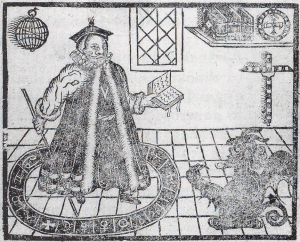Farmer, environmentalist and writer Wendell Berry joins Bill this week on Moyers & Company. To coincide with the broadcast, Harpers has made available an essay Berry wrote for the magazine in 2008 — “Faustian Economics.” In it, Berry writes that our society’s current predicament is well-represented by the Renaissance drama The Tragical History of Doctor Faustus, in which the title character wants “all knowledge and all the world for himself,” but “is a man supremely lonely and finally doomed.”
The problem with us is not only prodigal extravagance but also an assumed limitlessness. We have obscured the issue by refusing to see that limitlessness is a godly trait. We have insistently, and with relief, defined ourselves as animals or as “higher animals.” But to define ourselves as animals, given our specifically human powers and desires, is to define ourselves as limitless animals — which of course is a contradiction in terms. Any definition is a limit, which is why the God of Exodus refuses to define Himself: “I am that I am.”
Even so, that we have founded our present society upon delusional assumptions of limitlessness is easy enough to demonstrate. A recent “summit” in Louisville, Kentucky, was entitled “Unbridled Energy: The Industrialization of Kentucky’s Energy Resources.” Its subjects were “clean-coal generation, biofuels and other cutting-edge applications,” the conversion of coal to “liquid fuels” and the likelihood that all this will be “environmentally friendly.” These hopes, which “can create jobs and boost the nation’s security,” are to be supported by government “loan guarantees . . . investment tax credits and other tax breaks.” Such talk we recognize as completely conventional. It is, in fact, a tissue of clichés that is now the common tongue of promoters, politicians and journalists. This language does not allow for any computation or speculation as to the net good of anything proposed. The entire contraption of “Unbridled Energy” is supported only by a rote optimism: “The United States has 250 billion tons of recoverable coal reserves — enough to last 100 years even at double the current rate of consumption.” We humans have inhabited the earth for many thousands of years and now we can look forward to surviving for another hundred by doubling our consumption of coal? This is national security? The world-ending fire of industrial fundamentalism may already be burning in our furnaces and engines, but if it will burn for a hundred more years, that will be fine. Surely it would be better to intend straightforwardly to contain the fire and eventually put it out! But once greed has been made an honorable motive, then you have an economy without limits. It has no place for temperance or thrift or the ecological law of return. It will do anything. It is monstrous by definition.
In keeping with our unrestrained consumptiveness, the commonly accepted basis of our economy is the supposed possibility of limitless growth, limitless wants, limitless wealth, limitless natural resources, limitless energy and limitless debt. The idea of a limitless economy implies and requires a doctrine of general human limitlessness: all are entitled to pursue without limit whatever they conceive as desirable — a license that classifies the most exalted Christian capitalist with the lowliest pornographer.


